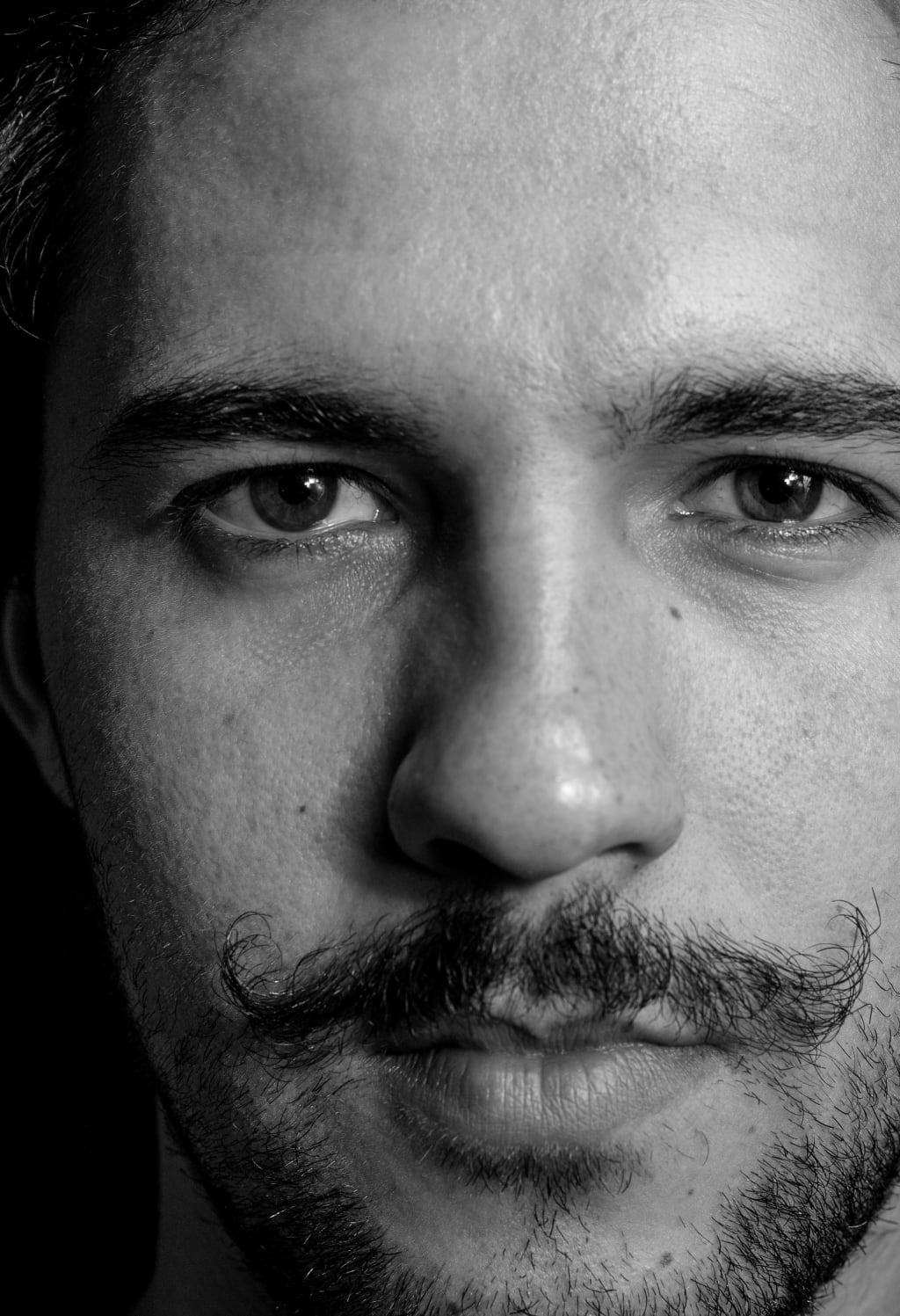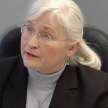The Man Who Disappeared
For Agatha

The man with no heart was average in every other way, which was exactly as it should be. Average height and weight, an ordinary man with ordinary brown hair and unremarkable eyes. Blue? Brown? People were never sure. They could pass him on the street and never remember him. This, and his cold-blooded ruthlessness, made him the perfect assassin.
But she, Mia, knew him only in his other guise, as the gallant Philip Jonathan Smith, who stood straight, his hair swept back, his collar open to reveal a glimpse of a tattoo, perfectly even white teeth and a charming smile. It was his voice she fell in love with first. Smooth, deep, confident.
Like her father, he was often away on business, but when he was there, and when he told her he loved her, she melted in his arms.
And then, he disappeared.
As it happened, her father was not in Washington either. After hours of worry and a fruitless visit to the police, who smirked about a missing boyfriend and told her to wait, she texted Christie, a girlfriend from college days who was now in the CIA.
Christie’s reply was cryptic: “Can’t help. See Poirot.”
It was laughable, this young private eye calling himself Hercule Poirot, but in spite of his ridiculous name, Mia found herself climbing the steps of a well-kept Georgetown brownstone and ringing the bell. She was ushered in and up another set of stairs.
“Mademoiselle?” He was a small man, perfectly trim and debonair in clothing that somehow suggested the Belgium of a previous era. The kicker was his mustache, barely-there whiskers that somehow managed to turn up at the ends.
She choked back a laugh.
He asked her for her name, and when she said, “Mia Eisenburg,” she thought she saw one eyebrow flicker upward. Had he recognized the name? He leaned forward, turned over some papers and set a cup of hot chocolate on them.
“How is it that you come here, to see me?” asked Poirot.
Mia told him about Christie’s recommendation, and after a pause, she said, “I have a problem. A missing person. Philip Jonathan Smith, my boyfriend.”
“Ah,” he inquired delicately. “Your relationship, has it deranged, I think I mean, ‘deteriorated,’ recently?”
“No,” she said, disappointed that he would take this tired old tack. “We were to be married soon. Well, not exactly married. Who does that anymore? But he was planning to move in soon. This week, actually. And then nothing. He did not meet me as planned, and his phone goes automatically to voice mail.”
“Why is it not his parents inquiring?”
“They have both passed away, and he has no siblings. I’m afraid no one will pay much attention to his disappearance but me.”
“And your parents? Why do they not accompany you?”
She sighed. “My mother died some years ago. My father and I are very close, but just now he is out of town on business. He often travels.”
“You have a photograph, no?”
She nodded, lifted her phone and turned the screen to him. “I’ll send it to you at…?”
“Not necessary.” He held up his phone, pushed a button or two and turned the screen toward her phone. With a tiny flash, the image transferred.
“Before I take this case,” said Hercule Poirot, “I ask you to tell me everything.”
“I have. I don’t know anything more.”
“Are you sure?”
“Absolutely.”
“Then there is nothing I can do. I cannot help you.”
“But why?”
“Because, mademoiselle, you are holding something back.”
There was a moment’s pause, and then Mia fished something from her pocket and handed an envelope to Poirot. “I suppose this is what you mean.”
Poirot took a piece of paper from the envelope and unfolded it. He saw at once that it was a sheet from a Moleskine notebook. The compact size, the fine lines, the quality of the paper, all were unmistakable.
She said simply, “My father always carries a small black notebook, the Moleskine kind. This envelope arrived today.”
The page was not torn out, Poirot saw, but had been cut cleanly. On it was what appeared to be a password.
“I’ve tried to do something with it,” said Mia. “But what good is a password without a URL?”
“Perhaps it’s not a password but a passcode. May I have your phone?” Poirot tapped in the code and a cryptic message popped up: “NCB 1502C.”
Poirot selected one of the papers on his table, stood, and held out his hand to his visitor. “Come, mademoiselle, we have no time to waste.”
“What?”
“Hurry, Mademoiselle Mia. That is a number for a safety deposit box at National Capital Bank. NCB, mon ami, National Capital Bank.”
Very soon they sat opposite each other in one of the bank’s most exclusive private spaces, a meeting room paneled in walnut and furnished with padded leather chairs. It even smelled rich, Mia thought. Between them, on the conference table, the safety deposit box lay open. In it were a cashier’s check for $50,000, a cloth bag full of old German coins, 19th century documents, and another black Moleskine notebook.
Poirot seemed to have lost interest. He spent some time arranging the coins, perhaps from small to large, flipped through the notebook, and texted someone. But when he looked up, there was a twinkle in his green eyes. “It’s your inheritance, mon ami.”
“My inheritance! Does this mean my father’s dead?” She was shocked, and her hand flew to her lips.
“No, no, your papa is not dead, but he is arrested. For conspiring to overthrow the country.”
“Oh, my God. Did he do this? It's impossible. Why would he, of all people, do such a thing?”
“To save you, Mademoiselle Mia. And the country. Philip Jonathan Smith was actually John Smith…”
“Yes, he always laughed about being called ‘John Smith.’ He said he may as well be ‘John Doe.’”
Hercule Poirot looked at her closely. “He was one of the White Cross’s most deadly assassins.
“The White Cross!” Mia was stunned. It was a domestic terrorism group, perhaps the most dangerous in America.
“He was using you to get to your papa, no? To keep an eye on him. To have him, as you say, ‘over a barrel.’”
“My father … wasn’t mixed up with the White Cross, was he? I’ve always wondered if there were Nazis in the family – my uncles, cousins, great-uncles. Only my father came to this country, and there were things he wouldn’t talk about. Were the others Nazis?” She was horrified.
“Absolutely not, au contraire. Your grandfather and his brothers made a pact to fight Hitler from both sides of the Atlantic. Your grand-père very nearly succeeded in assassinating Hitler. Sadly, whole armies it took, to destroy the ogre.”
“But what does this have to do with today? And my father?”
“Your papa carried on his father’s work, infiltrating neo-Nazi groups and destroying them from within. John Smith was going to assassinate the United States president this weekend. Your father killed him. He had no choice.”
“But now he’s been arrested for it? If you know all this, won’t the government? Won’t they release him?”
“Oh, non, mon ami. The story will be that FBI agents found them, killed John, and arrested your father. Your papa, he will say nothing – to the White cross, this will confirm his loyalty, that he protects the identity of the new Grand Marshal. He’ll stand trial, although the government will make it as quick and painless as possible. Somewhere along the line – probably after he’s been convicted, he’ll be killed, ‘trying to escape custody,’ I imagine.”
She gasped.
“It will all be a ruse! I should have said that first, excusez-moi! He’ll disappear into a new identity. He’s quite good at that, your papa, and will reappear, perhaps as a backwoods fanatic in Michigan or as an Idaho rancher, and do what he does best, infiltrate and destroy another cell.”
“So I can’t see him.” She looked stricken. “Jonathan is dead, and my father is, is lost to me.”
“He will find a way to be contact you, mon ami.”
Mia touched the row of old coins. “What’s all this?”
“Ah, this is to keep you safe. They got so close to you this time. He would want you to live very quietly indeed, somewhere inconspicuous.”
“And these things?” She picked up the Moleskine notebook and the old documents.
“Don’t you suppose he has private things to say to you? Answers to some of your questions. And these documents will help you understand where your family came from and perhaps why they fought so passionately.”
Poirot asked, “May I?” and taking the notebook from her, he opened it to a certain page and slid the note she had received into place.
With a sharp intake of breath, she saw that the cut line fit perfectly. It meant her father had been here quite recently. “However did you…?”
“I receive security briefings, mademoiselle.” Poirot turned over the paper he had brought and pointed to the name Eisenberg. Mia’s father. “To a few of us, Philip Jonathan Smith was a known threat. You would be surprised at how harmless, how insignificant he could appear.”
She sat back, taking it all in. And then she leaned forward again and said earnestly, “Fifty thousand dollars is very generous but not really enough to change anything. I’ll have to stay here, keep my job.” Her voice rose in a note of panic. “They’ll be able to find me.”
Poirot selected one of the coins he had been arranging. “This, it changes everything. You’ll find this is worth several million, perhaps twenty. It’s Napoleonic, I believe, and it means you can live wherever it’s safest. I would put away much of it to take care of your papa, should he ever need it, although there are many who would pay to keep a man so valuable from any harm whatsoever. He is a hero, Mia.”
“I feel like such a fool,” she murmured. “I put my father in danger. And now…” She shivered in fear.
He said, “Your friend, Mademoiselle Officer Christie, she waits outside with a detail. They will see to your safety.”
When Mia still looked worried, Poirot said gently, “You are to go now, mademoiselle, tonight. The bankers, they take care of everything. I will be sure. Think of it as a vacation, mon ami. Paris, maybe?”
Mia stood and extended her hand. “You were waiting for me.”
“We had our hopes you would find us,” he said. In the finest continental manner, he took the tips of her fingers and kissed them.
About the Creator
Rose Kleidon
University professor emerita (English). Member, the Historical Novel Society and Historical Writers of America. Presenter at conferences for writers and historians. Co-owner and co-founder of Kleidon and Associates. Novelist.






Comments
There are no comments for this story
Be the first to respond and start the conversation.